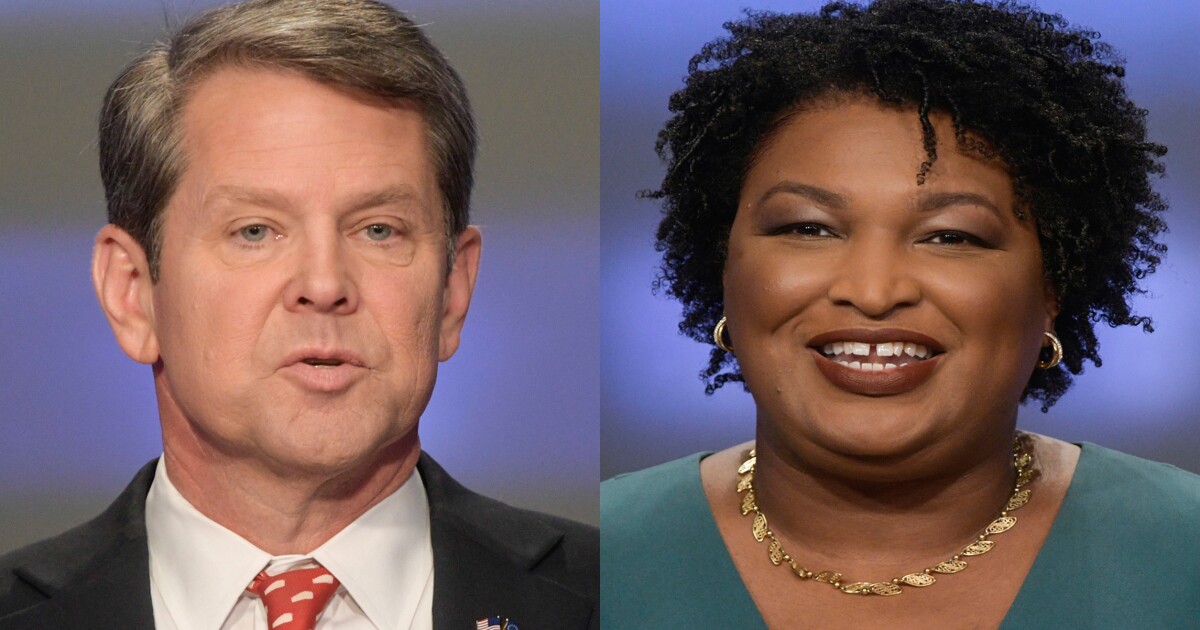

Things got heated on the Atlanta Press Club stage Monday evening as Georgia Gov. Brian Kemp (R) and Democratic hopeful Stacey Abrams clashed in their first televised debate of the 2022 midterm election cycle.
During the hotly anticipated matchup, Kemp and Abrams tackled a range of hot-button issues such as education, crime, the economy, and election denialism. Abrams entered the debate hoping it could stem her polling woes, as she continues to lag behind the incumbent governor in most election surveys.
BRIAN KEMP AND STACEY ABRAMS TO SQUARE OFF IN FIRST DEBATE AS EARLY VOTING BEGINS
Kemp touts a 5-point lead over Abrams in the latest RealClearPolitics polling aggregate. He narrowly edged her out in their 2018 gubernatorial contest with a less-than-2-point margin of victory. In the time since, he has seemingly gained ground with Peach State voters.
The debate centered heavily on hot topics from the campaign trail, but candidates were largely limited to roughly 60-second answers with 30-second rebuttals, making for a jam-packed hour. The debate also featured Libertarian candidate Shane Hazel, who was eager to boost his profile. A second debate between the Georgian gubernatorial giants is slated for Oct. 30.
Here are the top takeaways from Monday night’s debate:
Education takes center stage
A pronounced issue during the debate was how candidates planned to improve the Peach State’s education system. Abrams harped on how teacher retention has been sagging in the state and frequently cited the matter as one of Kemp’s greatest failures in office.
Abrams argued that teachers still are not getting paid enough and dismissed Kemp’s policies aimed at stopping the teaching of critical race theory in the classrooms as a distraction.
“Under this governor, we have a 67% retention rate. Any other CEO who lost more than 30% of their workforce would be fired,” she said during the debate.
She proposed tapping into the state’s budget surplus to bolster teacher paychecks. Meanwhile, Kemp touted his support of a prior teacher pay raise and argued that there is still work to be done.
In contrast to his two rivals, Hazel declared that Georgia should privatize schools and eliminate the property tax.
A Libertarian foil
Going into the debate, most political pundits were keenly focused on the showdown between Abrams and Kemp. But for Hazel, the debate was an opportunity to shine in the spotlight while trailing massively in the polls. Throughout the debate, Hazel made his presence known.
Hazel frequently traded barbs with Abrams and Kemp and deployed attention-grabbing fiery rhetoric. He insisted that the “Left and Right are fascist and communist socialists” while portraying himself as a champion for liberty who will beat back an overly cumbersome government intrusion on individual liberty.
A onetime Republican, Hazel put Kemp on defense over closing parts of Georgia’s economy during the early stages of the pandemic. He also sparred with Abrams on China and guns, among other issues. Unlike Kemp and Abrams, Hazel argued that there should be no limits on guns.
I asked an @atlpressclub rep about Libertarian candidate Shane Hazel’s presence at tonight’s debate:
I’m told ATL Press Club extends an invitation to any candidate to participate. No polling threshold to meet. As long as they’re on ballot, they’re invited to debate #gapol #gagov
— Blayne Alexander (@ReporterBlayne) October 18, 2022
Abrams confronted on election denialism
Early on in the debate, Abrams defended her decision not to formally concede her 2018 election loss to Kemp. Her failure to concede has given Republicans ammunition against the Left as they seek to deflect criticisms about former President Donald Trump’s controversial claims the 2020 election was stolen from him.
“I began my speech on Nov. 16, acknowledging that Gov. Kemp had won the election. I then proceeded to lay out in great detail the challenges faced by voters under his leadership as secretary of state,” Abrams said.
“I intend to stand up for the right to vote, I will always acknowledge the outcome of elections, but I will never deny access to every voter,” she later added.
Kemp quickly shot back, dismissing her allegations that his administration has sought to suppress voters. He argued that “in Georgia, it’s easy to vote and hard to cheat” and noted the turnout increase among African Americans, Latinos, and other voters that transpired after Georgia enacted election reforms.
The classic gun and crime tug of war
Mirroring a similar line of attack from other Republicans nationally, Kemp sought to cast Abrams as soft on crime during the debate, citing her anemic support from Georgian sheriffs and service on the boards of organizations that promoted the “defund the police” movement.
“No sheriffs are endorsing her statewide because of her stances on wanting to defund the police, eliminate cash bail, and serving on the boards of organizations … that are promoting the ‘defund the police’ movement,” Kemp said.
Abrams returned fire on many of those points of attack, insisting she backed the police during her time in the state legislature. Like other Democratic candidates facing attacks on law enforcement from the GOP, Abrams sought to shift focus to gun violence, sensing a perceived weakness for Kemp on public safety matters.
“We can protect the Second Amendment and protect second graders at the exact same time,” Abrams said.
“We can protect the 2nd Amendment and protect 2nd graders at the exact same time.”
— Stacey Abrams (D) calls out GA Gov. Brian Kemp (R) for allowing conceal carry permits without background checks. pic.twitter.com/GDzj6n2QJQ
— The Recount (@therecount) October 18, 2022
Kemp cited his support for reopening schools and cracking down on gang violence as measures he had taken to curtail gun violence afflicting the Peach State. He also noted that many women and minorities seek to carry guns for self-defense.
“The largest fastest growing segment of the population that’s buying handguns and firearms is African Americans and females,” he said. “You have local governments that are holding up concealed weapons permits, that are keeping law-abiding citizens from being able to simply use their Second Amendment right to protect themselves and their property and their families.”
CLICK HERE TO READ MORE FROM THE WASHINGTON EXAMINER
Abortion takes a back seat
Throughout midterm races across the country, abortion has become a key issue in polling and campaign jousting. But in the debate Monday, the issue garnered less attention than it has in other debates.
At one point, a moderator pressed Kemp on whether he would ban emergency contraceptives in the state, but the governor quickly put the matter to rest, arguing he would not and instead shifted the focus to bread-and-butter issues.
Abrams raised abortion in passing a few times throughout the debate, slamming Kemp for what she said was infringing upon a woman’s right to choose, but the issue didn’t rise to the fore during most of the sparring between the pair.
Georgia was one of the Republican-led states that enacted a restrictive ban on abortion after a so-called fetal heartbeat is detected, which can occur as early as six weeks of gestation. Some scientists dispute that a fetus has a heartbeat at that stage of pregnancy.
Recent polling has indicated that economic issues such as inflation and rising prices at the gas pump have begun to overshadow abortion in voters’ minds even after the Supreme Court overturned Roe v. Wade.







